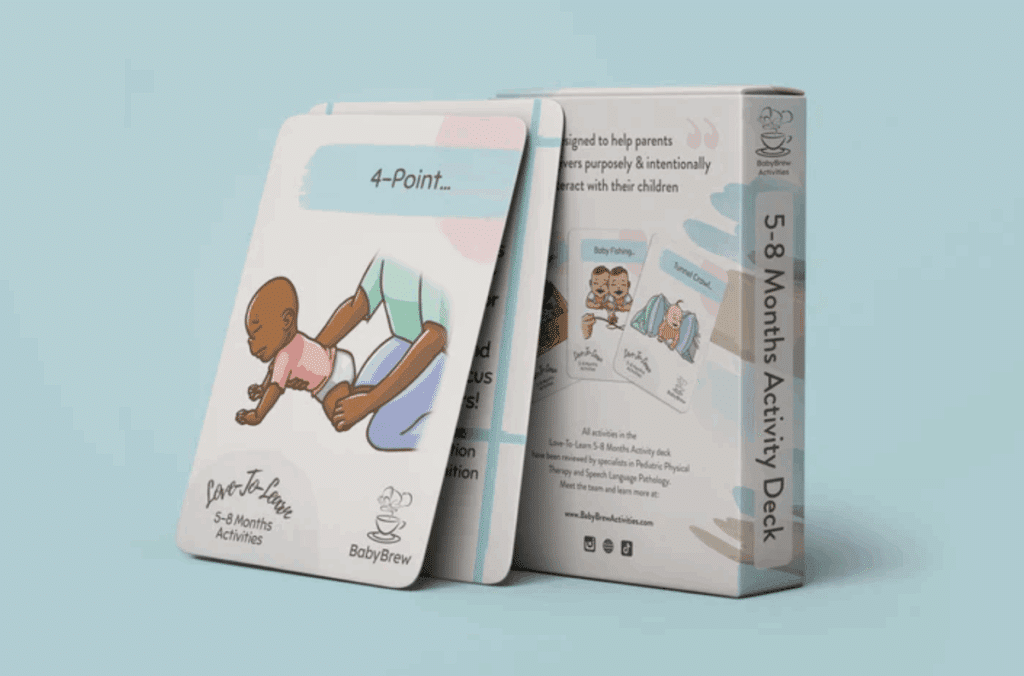Babies grow and change so quickly during their first year! From learning to roll over to starting solids, every milestone is supported by the development of sensory and motor skills. And one of the best ways to support that development is through play!
Play is how babies explore their world – through touch, sound, movement, and even taste. These early sensory experiences help build the foundation for big milestones like sitting, reaching, mouthing, and eventually self-feeding.
So let’s review simple, age-appropriate sensory activities that help babies build important developmental skills. Whether your baby is just starting to grab toys or beginning to show interest in food, these ideas support everything from oral motor skills to body awareness and curiosity.
Why Activities Matter for Feeding Skills
As a pediatric dietitian, I’m always talking about play when babies are about to start solids. It’s not just about what they eat, but how they build the skills to get there. Sensory and motor play helps babies develop the oral motor control and hand-eye coordination they need for feeding.
When babies explore with their hands and mouths, they start to understand textures, build muscle strength, and improve body awareness. These skills are essential not only for eating, but for sitting, reaching, and grasping.
Giving babies space to play in a responsive, low-pressure way helps them feel confident and curious as they move through each new stage.
Where to Find Developmentally Appropriate Baby Activities
If you’re looking for activities that support your baby’s growth through each stage of the first year, I highly recommend checking out Baby Brew. Their activity decks are filled with intentional, age-appropriate play ideas that are simple, screen-free, and backed by specialists.
Each activity has been reviewed by pediatric physical therapists, occupational therapists, and speech-language pathologists to make sure it’s just right for your baby’s age.
Plus, they’re designed with busy parents in mind! No craft supplies or prep needed. Just everyday items and thoughtful suggestions you can start using right away.

Best Sensory Activities for Babies (Before 6 Months)
Early exposure to different textures and sensations helps babies build awareness of their body and their environment. Even before solids, these sensory activities support oral development and lay the groundwork for feeding.
Tummy Time with a Twist:
Place a baby-safe mirror or soft utensils like plastic spoons in front of your baby during tummy time. Watching and reaching builds visual focus and hand-eye coordination.
High Chair Toy Play:
Suction toys to the high chair tray to help your baby get used to sitting upright and engaging with objects in the same space where they’ll later eat.
Soft Spoon Exploration:
Offer an empty silicone or plastic spoon for baby to mouth. This introduces utensils and builds early oral motor skills.
Wet Washcloth Play:
Let baby mouth or chew on a damp washcloth. It’s soothing and helps them get used to new textures around their mouth.
Sensory Bags:
Create sealed, squishy bags with safe textures like pureed peas, applesauce, or yogurt. These are great for visual and tactile play while baby is seated.
Best Sensory Activities for Babies (After 6 Months)
Once solids have started, sensory activities can shift to include more real food exploration. These activities help build coordination, comfort with textures, and readiness for more independent eating.
Practice with Real Foods:
Offer safe items like mango pits, meat bones, or corn on the cob for baby to explore. They won’t get much food, but it’s fantastic motor practice and helps them learn about texture and grip.
Straw Drops:
Fill a straw with water and let it drop into baby’s mouth. This helps babies practice sipping and oral coordination in a fun, low-pressure way.
Encouraging Pincer Grasp Practice:
Offer small items like baby puffs or bite-sized pieces of fruit for baby to try picking up with their fingers. This skill is essential for self-feeding.
Playtime with Utensils:
Give baby a spoon and small open cup to mouth, bang, and explore. It builds familiarity and makes mealtime feel less intimidating.
Don’t forget to check out Baby Brew for many more easy, developmentally-appropriate ideas to support your baby during this stage.
The Bottom Line
All of these playful activities are helping your baby build confidence, coordination, and comfort with feeding. Messy play is meaningful – it’s how babies learn about food, textures, and their own bodies.
And if you’re looking for more simple, intentional activities to support your baby’s growth, be sure to check out Baby Brew. Their activity decks are such a helpful tool during this exciting (and sometimes overwhelming) stage.
This post may contain affiliate links, meaning I will receive a commission if you decide to make a purchase through my links, at no cost to you. For more information, please read my Terms of Use and Service.

Nice share!